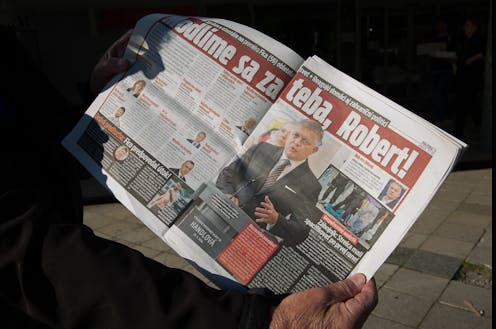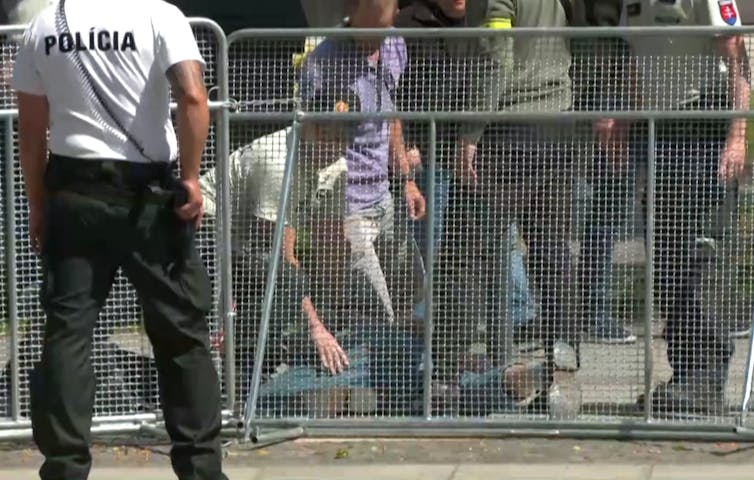
The assassination attempt against Slovakian Prime Minister Robert Fico has been widely condemned by world leaders as an attack on democracy.
In Slovakia, the violent act similarly saw a unified response from the country’s deeply divided political leaders. But how long this lasts is uncertain. Just as outgoing Slovakian president – and Fico rival – Zuzana Čaputová called for an end to the “vicious circle of hatred and mutual accusations,” Fico allies lambasted the country’s media and opposition for whipping up tensions.
As an expert on politics in central Europe, I have been interested in how liberal social movements in Slovakia have reacted to the rise of populist rhetoric and policy that Fico exemplified. This research has laid bare not only the increasing move to the right of once center and center-right politicians, but also how this has helped create a polarized political environment.
Who is Robert Fico?
Robert Fico has long been a controversial figure in Slovakia, a central Eastern European country of about 5.4 million people and a member of the European Union.
A former member of the Communist Party of Czechoslovakia, Fico and his colleagues founded the Party SMER, or “Direction,” in the late 1990s as a leftist party that was critical of Slovakia’s right-wing government at the time. The party also maintained an anti-corruption message and used this to gain popularity in the early 2000s, becoming one of the most dominant parties in Slovak politics.
Fico first became prime minister in 2006. But it is since returning to power in 2012 that he has been seen as a polarizing figure in Slovak politics.
In 2018, Fico was forced to resign following the murder of journalist Jan Kuciak and his fiancée, Martina Kusnirova, in their apartment just outside of Bratislava, Slovakia’s capital.
Prior to his murder, Kuciak alleged that SMER was engaged in corruption involving the Italian Mafia and the embezzlement of EU funds. In 2020, five people, one of whom had links to political figures, were charged with the murders.
Fico has denied these corruption charges. Yet the murders and accusations of corruption led to mass protests against the government and continue to resonate today.
Polarized politics
Despite Fico’s resignation over the issue, the country continued to be politically polarized.
In 2019, Čaputová of the party Progressive Slovakia was elected as the first female president. But a year later, Slovakia saw the election of the most conservative parliament in modern Slovak history.
This pitted Čaputová’s liberal agenda against the right-wing parties in government.
Right-wing parties have allied with the Catholic Church and conservative organizations to attack gender equality measures and LGBTQ+ rights and place restrictions on reproductive rights.
The focus on culture war issues has been accompanied by a coarsening of the political debate in Slovakia.
Hateful rhetoric is commonly used in political campaigns to oppose women’s rights, gender equality and LGBTQ+ rights. This rhetoric has contributed to further polarization.

And even before the attack on Fico, there was evidence that the heightened rhetoric was developing into politically motivated violence. In 2022, two members of the LGBTQ+ community were murdered at a bar in Bratislava by a known supporter of the far right.
Nevertheless, Fico continued to rely on populist rhetoric opposing civil liberties in his 2023 election campaign.
By then, he had returned to the spotlight by opposing public health measures related to the COVID-19 pandemic. This was followed by his widely publicized opposition to sending military aid to Ukraine after Russia’s 2022 invasion. At a time when some of Slovakia’s closest allies, such as Poland and Czechia, wholeheartedly supported Ukraine’s efforts against Russian aggression, Fico ran on a campaign of supporting Hungary’s Viktor Orban and Vladimir Putin’s politics against the West.
This messaging proved popular and allowed him to return to power in 2023, with his populist party winning 23% of the vote and becoming the largest party in a right-wing coalition government.
An attack on democracy
Since returning to power, Fico has shown no desire to dial down the culture wars that have split Slovakian society. Rather, his primary focus has been on abolishing and restructuring government agencies and entities that have been critical of his policies.
In February 2024, he moved to shut down Slovakia’s anti-corruption body and abolish the special prosecutor’s office that investigates corruption – a decision that not only drew rebuke from the European Union but also brought Slovaks back out into the streets in protest.
He has also made moves to shut down Slovak Television and Radio, or STVR, and replace it with a state-run TV channel.
Taken together, Fico’s efforts to curb civil liberties and repress opposition have been seen as part of a process to transform Slovakia into an illiberal democracy, much in the mold of Orban’s Hungary.
There is much yet to learn about the motivations and circumstances surrounding the assassination attempt on Fico. But officials have said that it was “politically motivated,” linking it to his divisive policies.
Any display of political violence is, as world leaders have noted, an attempt to undermine democracy. In Slovakia, where political polarization is high, these divisive politics have been shown to, unfortunately, lead to violent outcomes.
Alexandria Wilson-McDonald receives funding from: Fulbright Research Grant to CR 2018-2019
This article was originally published on The Conversation. Read the original article.







